|
|
|
Sort Order |
|
|
|
Items / Page
|
|
|
|
|
|
|
| Srl | Item |
| 1 |
ID:
167250
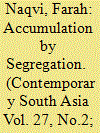

|
|
|
|
|
| Summary/Abstract |
This article is part of a Book Forum review of Ghazala Jamil’s book Accumulation by Segregation (2017). The Book Forum consists of individual commentaries on this text by four interested scholars, followed by a response by the author. The article may be read individually or alongside the other contributions to the Forum, which together constitute a comprehensive discussion of the themes and arguments in the book.
|
|
|
|
|
|
|
|
|
|
|
|
|
|
|
|
| 2 |
ID:
167254
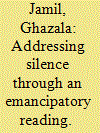

|
|
|
|
|
| Summary/Abstract |
This article is part of a Book Forum review of Ghazala Jamil’s book Accumulation by Segregation (2017). The Book Forum consists of individual commentaries on this text by four interested scholars, followed by a response by the author. The article may be read individually or alongside the other contributions to the Forum, which together constitute a comprehensive discussion of the themes and arguments in the book.
|
|
|
|
|
|
|
|
|
|
|
|
|
|
|
|
| 3 |
ID:
103683
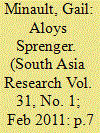

|
|
|
|
|
| Publication |
2011.
|
| Summary/Abstract |
Aloys Sprenger (1813-1893) was an Austrian scholar with a medical degree who joined the British East India Company's medical service in order to pursue in India his real passion, the study of oriental literatures. He became the Principal of Delhi College in 1845, and presided over an experiment in learning at Delhi College, an institution that taught both eastern and western literatures and sciences through the medium of Urdu. The college attempted to bring about a creative synthesis of the two curricula, via an active programme of translation and publication. Sprenger helped launch a series of scholarly journals published by the college, thus contributing to the dissemination of knowledge and the nurturing of a group of students and faculty with whom he maintained an active correspondence after leaving the college. This collection of letters has not been adequately evaluated earlier as an indication of the collaboration between western and Indian intellectuals in the period before the revolt of 1857. Most accounts of Sprenger's contributions to Delhi College have been laudatory. There was, however, a darker side to Sprenger's stewardship that deserves elucidation. Based on archival research, the present article seeks to evaluate Sprenger's ambiguous intellectual legacy to Delhi College and to the evolution of education in British India.1
|
|
|
|
|
|
|
|
|
|
|
|
|
|
|
|
| 4 |
ID:
159724
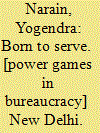

|
|
|
|
|
| Publication |
New Delhi, Manas Publications, 2017.
|
| Description |
263p.hbk
|
| Standard Number |
9788170495277
|
|
|
|
|
|
|
|
|
|
|
|
Copies: C:1/I:0,R:0,Q:0
Circulation
| Accession# | Call# | Current Location | Status | Policy | Location |
| 059438 | 923.5/NAR 059438 | Main | On Shelf | General | |
|
|
|
|
| 5 |
ID:
128544
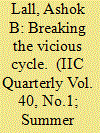

|
|
|
| 6 |
ID:
129920
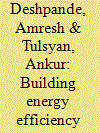

|
|
|
| 7 |
ID:
123670
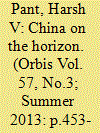

|
|
|
|
|
| Publication |
2013.
|
| Summary/Abstract |
While the world has been focusing on China's growing assertiveness in the South China Sea, Beijing and Delhi are also engaged in a quiet struggle in the contested waters. By putting up for international bidding the same oil block that India had obtained from Vietnam for exploration, China has thrown down a gauntlet.1 By deciding to stay put in the assigned block, India has indicated it's ready to take up the Chinese challenge. At stake is Chinese opposition to India's claim to be a regional power in the larger Asian strategic setting. India is trying to emerge as a credible regional balancer but it has a long way to go.
|
|
|
|
|
|
|
|
|
|
|
|
|
|
|
|
| 8 |
ID:
089386
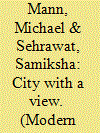

|
|
|
|
|
| Publication |
2009.
|
| Summary/Abstract |
Despite the contemporary importance of the Ridge forest to the city of Delhi as its most important 'green lung', the concept of urban forestry has been explored neither by urban historians studying Delhi nor by environmental historians. This article places the colonial efforts to plant a forest on the Delhi Ridge from 1883 to 1913 within the context of the gradual deforestation of the countryside around Delhi and the local colonial administration's preoccupation with encouraging arboriculture. This project of colonial forestry prioritized the needs of the white colonizers living in Delhi, while coming into conflict repeatedly with indigenous peasants. With the decision to transfer the capital to Delhi in 1911, the afforestation of the Delhi Ridge received a further stimulus. Town planners' visions of a building the capital city of New Delhi were meant to assert the grandeur of British rule through imposing buildings, with the permanence of the British in India being emphasised by the strategic location of the ruins of earlier empires within the city. The principles of English landscape gardening inspired the planning of New Delhi, with the afforestation of the Delhi Ridge being undertaken to provide a verdant backdrop for-the Government House and the Secretariat-the administrative centre of British government in India. Imperial notions of landscaping, which were central to the afforestation of the Delhi Ridge epitomised colonial rule and marginalized Indians.
|
|
|
|
|
|
|
|
|
|
|
|
|
|
|
|
| 9 |
ID:
127901
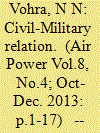

|
|
|
|
|
| Publication |
2013.
|
| Summary/Abstract |
I am very happy to have been asked to deliver the USI national Security Lecture 2013 and to speak on "Civil-Military Relation Opportunities and Challenges".
Before I proceed to reflect on the theme of taday's lecture, I think it would be useful to have reasonable clarity about what exactly do we have in mind when we use the term "civil military relations". I say this because earlier this year, at a seminar held in a defence think-tank at Delhi, a statement was made that "unsatisfactory civil-military relation are having an adverse impact on the functioning of the military in India". While all those who may be involved in studying military matters would understand that this statement refers to the functioning of the defence apparatus, I feel that a free use of the term "civil and military relations" should be best avoided as its has the potential of causing altogether unfounded doubts and suspicions in the minds of millions of people in India.
|
|
|
|
|
|
|
|
|
|
|
|
|
|
|
|
| 10 |
ID:
093725
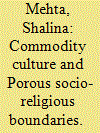

|
|
|
|
|
| Publication |
2010.
|
| Summary/Abstract |
Based on fieldwork, this article portrays the deep influence exercised by modern media on the women in a Muslim neighbourhood in Delhi during the past 30 years. While visual media consumption was earlier largely tabooed and restricted, today's consumers of media products appear significantly influenced by a media-driven com-modification of culture. The research findings indicate that a revision of 'traditional' assumptions about the lifestyles and thought patterns of Muslim women, at least in this particular neighbourhood in Delhi, is required to understand the current daily realities of Muslim women's lives in South Asia.
|
|
|
|
|
|
|
|
|
|
|
|
|
|
|
|
| 11 |
ID:
167253
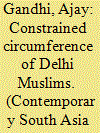

|
|
|
|
|
| Summary/Abstract |
This article is part of a Book Forum review of Ghazala Jamil’s book Accumulation by Segregation (2017). The Book Forum consists of individual commentaries on this text by four interested scholars, followed by a response by the author. The article may be read individually or alongside the other contributions to the Forum, which together constitute a comprehensive discussion of the themes and arguments in the book.
|
|
|
|
|
|
|
|
|
|
|
|
|
|
|
|
| 12 |
ID:
084242
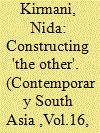

|
|
|
|
|
| Publication |
2008.
|
| Summary/Abstract |
The research for this paper is based in a majority-Muslim neighbourhood in South Delhi, Zakir Nagar. As with most urban localities, the borders around Zakir Nagar are permeable-with residents frequently moving in and out of the neighbourhood and coming into contact with members of other religious groups. Many of the residents of Zakir Nagar have also lived in religiously mixed areas previously. Furthermore, although the neighbourhood is itself identified as 'Muslim', it is by no means homogeneous, so that multiple social boundaries operate even within this locality. This paper looks more closely at the issue of religious identity as it was narrated in relation to various and shifting 'others'. These 'others'-referred to in the context of friendship, neighbours and marriage as well as in terms of discrimination, riots and 'communalism'-were often identified as 'Hindus' or as 'non-Muslims', but were also often referred to members of different class, status or regional groups. Hence, boundaries around 'us' and 'them' shifted according to context and were contingent upon various factors alongside religious identity. Through the narratives of Zakir Nagar residents, religious identity emerged as itself a problematic category whose meaning and
|
|
|
|
|
|
|
|
|
|
|
|
|
|
|
|
| 13 |
ID:
129539
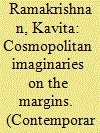

|
|
|
|
|
| Publication |
2014.
|
| Summary/Abstract |
In this article, I examine how social boundaries are drawn and contested by residents in a Delhi resettlement colony, established in 2004 and expanded during the wider slum clearance drive, prior to the 2010 Commonwealth Games. Drawing from life narratives, I explore how residents navigate new social terrains and decide in which situations difference becomes a salient issue. Building on literature that engages with subaltern forms of cosmopolitanism, I argue that openness and conviviality are seen as predominantly urban behaviors, external to that of the colony located on the margins of the city. Residents instead express ambivalent and sometimes contradictory subjectivities in quotidian encounters, and often see social distancing as a necessary tactic. I suggest the narratives offer a nuanced understanding of the multiple constructions of home, community, and belonging amongst the marginalized in and 'beyond' the city.
|
|
|
|
|
|
|
|
|
|
|
|
|
|
|
|
| 14 |
ID:
112742
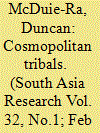

|
|
|
|
|
| Publication |
2012.
|
| Summary/Abstract |
Based on fieldwork, this article examines various aspects of tribal migration from the Northeast frontier of India to Delhi, a phenomenon which increased rapidly in the last half decade or so. This offers insights into four important interlinked processes. First, such migration indicates significant changes taking place in the Northeast itself. While many migrants leave the region to escape conflict, many more simply seek to find work, pursue education and fulfil changing aspirations. Second, tribal migration to Delhi reveals the ways in which the city itself has been changing. While tribal migrants search out employment opportunities in neoliberal capitalist spaces, employers in such spaces have specific reasons to desire tribal labour, particularly in shopping malls and call centres. Third, tribal migrants encounter racism and discrimination in Delhi and their experiences reveal how racial issues function and are debated today within India. Fourth, tribal migrants themselves embody the dramatic discord between the ways tribals see themselves and the ways they are perceived in India.
|
|
|
|
|
|
|
|
|
|
|
|
|
|
|
|
| 15 |
ID:
190724
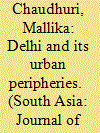

|
|
|
|
|
| Summary/Abstract |
This paper draws on the larger experience of urbanisation in two villages in Delhi, in particular the changing political and social life of these villages. Based on field research conducted between 2017 and 2019, it aims to explore the associational life of the villages and the ways in which traditional and newer forms of association and governance interact with each other and the state. In the new landscape, where panchayats operate alongside resident welfare associations and youth-led self-help organisations, a multiplicity of ‘political’ and ‘associational’ strategies have been adopted, with the invocation of terms such as ‘social work’ alongside an older invocation of biradari or community.
|
|
|
|
|
|
|
|
|
|
|
|
|
|
|
|
| 16 |
ID:
125051
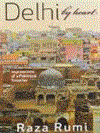

|
|
|
|
|
| Publication |
Noida, Harper Collins Publishers India, 2013.
|
| Description |
xi, 322p.Pbk
|
| Standard Number |
9789350294185
|
|
|
|
|
|
|
|
|
|
|
|
Copies: C:1/I:0,R:0,Q:0
Circulation
| Accession# | Call# | Current Location | Status | Policy | Location |
| 057517 | 915.456/RUM 057517 | Main | On Shelf | General | |
|
|
|
|
| 17 |
ID:
140953
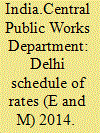

|
|
|
|
|
| Publication |
New Delhi, Central Public Works Department, 2014.
|
| Description |
92p.pbk
|
|
|
|
|
|
|
|
|
|
|
|
Copies: C:1/I:0,R:0,Q:0
Circulation
| Accession# | Call# | Current Location | Status | Policy | Location |
| 058316 | 692.5095456/IND 058316 | Main | On Shelf | General | |
|
|
|
|
| 18 |
ID:
140954
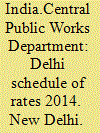

|
|
|
|
|
| Publication |
New Delhi, Central Public Works Department, 2014.
|
| Description |
x, 442p.hbk
|
|
|
|
|
|
|
|
|
|
|
|
Copies: C:1/I:0,R:0,Q:0
Circulation
| Accession# | Call# | Current Location | Status | Policy | Location |
| 058317 | 692.5095456/IND 058317 | Main | On Shelf | General | |
|
|
|
|
| 19 |
ID:
159697
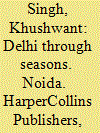

|
|
|
|
|
| Publication |
Noida, HarperCollins Publishers, 2015.
|
| Description |
12p.hbk
|
| Standard Number |
9789350294369
|
|
|
|
|
|
|
|
|
|
|
|
Copies: C:1/I:0,R:0,Q:0
Circulation
| Accession# | Call# | Current Location | Status | Policy | Location |
| 059410 | 508.5456/SIN 059410 | Main | On Shelf | General | |
|
|
|
|
| 20 |
ID:
176628
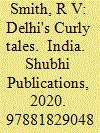

|
|
|
|
|
| Publication |
India, Shubhi Publications, 2020.
|
| Description |
180p.Hbk
|
| Standard Number |
9788182904804
|
|
|
|
|
|
|
|
|
|
|
|
Copies: C:1/I:0,R:0,Q:0
Circulation
| Accession# | Call# | Current Location | Status | Policy | Location |
| 059953 | 954.56/SMI 059953 | Main | On Shelf | General | |
|
|
|
|
|
|
|
|
|